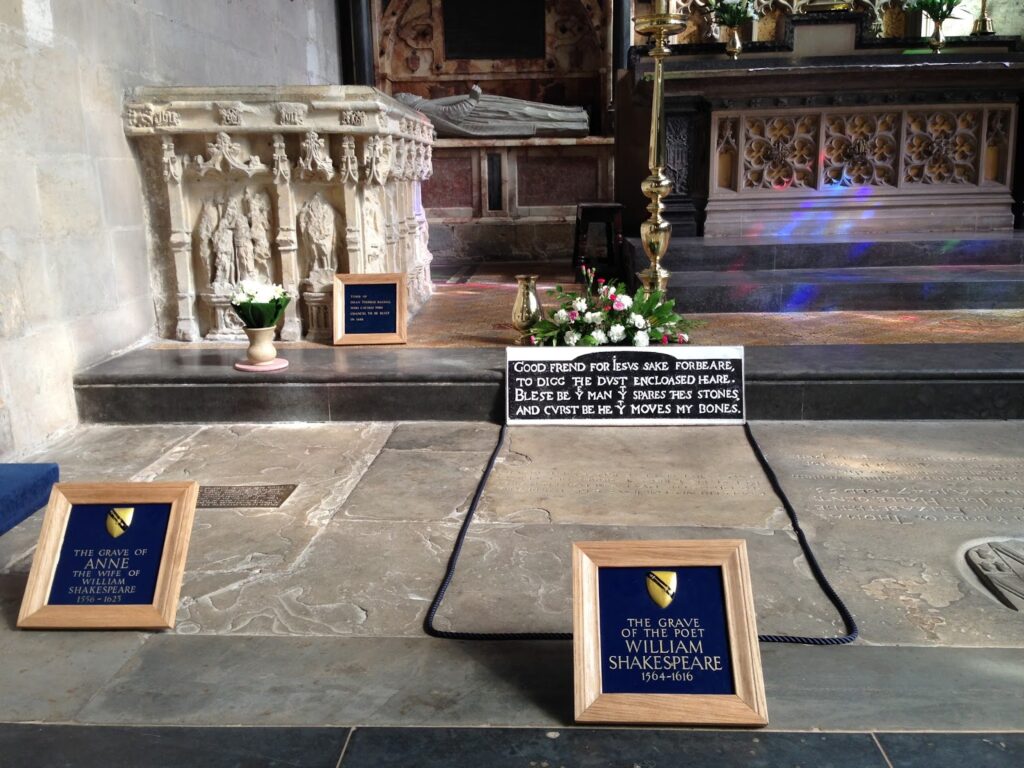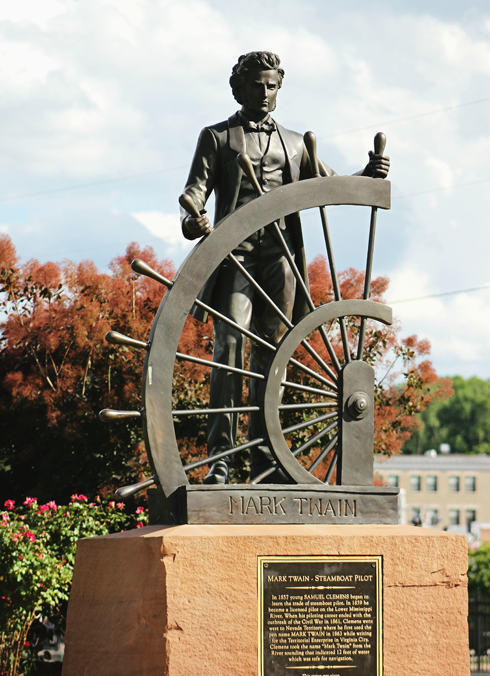
If Shakespeare were an American, we’d call him an all-American success story.
The son of a debt-wracked, piss-tanning glove-maker, raised in rural hickville one-horse Stratford-upon-Avon, William was a rambunctious youth who knocks up his fiancee three months before the wedding, is caught poaching on private property, and to escape arrest runs away to London (2 hours by National Rail but much longer by foot).
London of course was a rain-cursed city with no sewage, no social-services, and roughly the population and prestige of contemporary Kansas City. It wasn’t even Portland. Not that he could go anywhere else–England in his time was the back-water of Europe, barely beyond the Dark Ages. We presume Shakespeare arrived in this sorry excuse for a Big City penniless, broke, without friend, connection, or health insurance.
William somehow lands a job with some actors (commonly acknowledged to be immoral, lying, pandering lowlifes), and then disappears from all historic record…
…then re-appears several years later, wildly successful at everything he touches. Through sheer grit, determination and talent, he authors a full roster of block-buster plays beloved by the public, respected by royalty, and envied by his peers; so impressive is his pen that he scores an aristocratic patronage for his sonnets and long-poems, lest any accuse of him of being a “mere” playwright; the box-office will make him so fabulously wealthy that he wears the most expensive clothing, gets his portrait painted (twice), buys a royal crest for his father’s family, and becomes an investor in a London bridge; at the peak of his career, he writes and performs for the Queen of England personally, and that at a time when England itself ain’t doin’ too shabby–in William’s time, England defeats the undefeatable Spanish Armada thanks to the intercession of divine providence, and colonizes Virginia, laying the groundwork for a global-spanning empire (not to mention America itself).
That is, England is a rising power, and William a rising power within that rising power. He is beloved by Monarchs and Commoners alike. He’s done it all, he’s made it, risen to the top, he’s lived the American dream–all that and he probably isn’t even aware that history will rank him among humanity’s all-time greatest writers.
And that’s exactly what blows my mind: after accomplishing all this, at the top of his game, he returns to Stratford-upon-Avon, that hickville one-horse-town of his youth he couldn’t run away from fast enough.
He voluntarily returned.
That’s the thought that crossed my mind as I stood before Shakespeare’s grave at Holy Trinity Church in Stratford: Shakespeare had everything in London–fame, riches, popularity, prestige–and yet as he approached middle-age, he still chose to leave it all behind to return to podunk Stratford-upon-Avon.
Why? We can only guess of course–nostalgia perhaps; maybe also to rub his success in the face of the local nobles a bit, too; maybe to retire far from the hustle and bustle of the big city; maybe he just wanted to be buried in the same Holy Trinity Church where he was baptized.
Holy Trinity is still a functioning Church, by the way–when my brother and I visited Stratford one Sunday, we actually couldn’t visit his grave because the Church was busy holding regular worship services. Cause it was Sunday.
Which just charmed and thrilled me so much, you see–that it’s still a Church, and still acts like a Church. The whole rest of Stratford is in the utter thrall of Shakespeare tourism (I don’t begrudge them; without the pilgrims, Stratford would still be a one-horse hickville), with monuments and book-stores and souvenir shops and royal theatres and “authentic recreations” all tripping over each other. And that’s fine.
But Holy Trinity is still a Church. There is no bookstore and souvenir shop adjacent, no “authentically recreated” museums and so forth. There are morning prayers and Sunday services and a newsletter and youth groups and competition with the local Baptists and Jehovah’s Witnesses for members and a graveyard and, oh yes, if you’ll kindly follow the sign, there’s William Shakespeare’s grave over there, behind the knave. 2 pound donation if you please, to assist with this old chapel’s upkeep.
Get there early enough, you’ll have the whole place to yourself.
I guess the whole experience of standing before his country-church grave just sort of humanized Shakespeare for me in a new way–not merely to banally realize that he did in fact really live and even has real flesh and bones rotting in the ground (I already knew that), but to see that for all his genius for poetry, psychology, genre, history, for all his profound and unsentimental understanding of nature and mankind and of all our joys and fears and sins and dreams, that he was still a man who was under the vulnerable sway of very human (even quintessential) desires.
That is, in the end, William Shakespeare just wanted to go home.
And he did.
_____________

These same thoughts also passed through my mind when I finally visited Hannibal, Missouri, years later, to pay my respects to the birthplace of Samuel Clemens, AKA Mark Twain. At least theoretically, Stratford and Hannibal have much in common: both are small rural river towns out in the sticks that have scarcely grown since their most renowned resident left, whose sole claim to fame is to have produced their respective nation’s most famous writer, and have been trying to cash in on it ever since. They are both filled with monuments and museums and birth-homes and book-stores and gift-shops and theaters and “authentic recreations” all tripping over each other.
And who can blame them? Without Shakespeare and Twain tourism, both towns would continue to languish in obscurity. Maybe they wouldn’t even exist anymore.
Nevertheless, as I walked the Main Street of the “Historical District” of Hannibal, my feeling wasn’t one of revelation or insight as in Stratford, but of something sadder…Maybe it was the hanging street signs squeaking sadly in the cold, biting wind; maybe it was the fact that the Midwest in later-winter is a big, brown, uniform slog with grey skies; maybe it’s because to many, Missouri is best pronounced “Misery“; maybe it’s because any cursory reading of Twain will tell you how much he despised all of the kitchy, tacky knick-knacks that cluttered up American households as much back then as they still do today–but now it’s his face that’s been reduced to the same sort of cheap tourist clap-trap, completely missing the point of his writings, and that in his own hometown no less!
But maybe, it’s just knowing that Twain is not buried here, that he in fact elected to be buried up in New York state somewhere. Remember that after leaving Hannibal, Twain never lived there again, that he became world famous, that he traveled the globe extensively, that he saw far more of the Earth than even Shakespeare could have imagined. Now, Twain did come back to visit Hannibal late in his life, the museums all assured me of this, and they even confess that he was filled with a deep melancholy when he did. And why wouldn’t he? This is exactly why people don’t like to go to their high school reunions, because as nice as it is to take a trip down memory lane, there is something borderline tragic about seeing how little others have moved on with their lives after you did.
That is, for all his profound and unsentimental understanding of nature and mankind and of all our joys and fears and sins and dreams, Twain was still a man under the vulnerable sway of very human (even quintessential) desires.
But unlike Shakespeare, Twain sadly knew he could never go home again.
And he didn’t.
